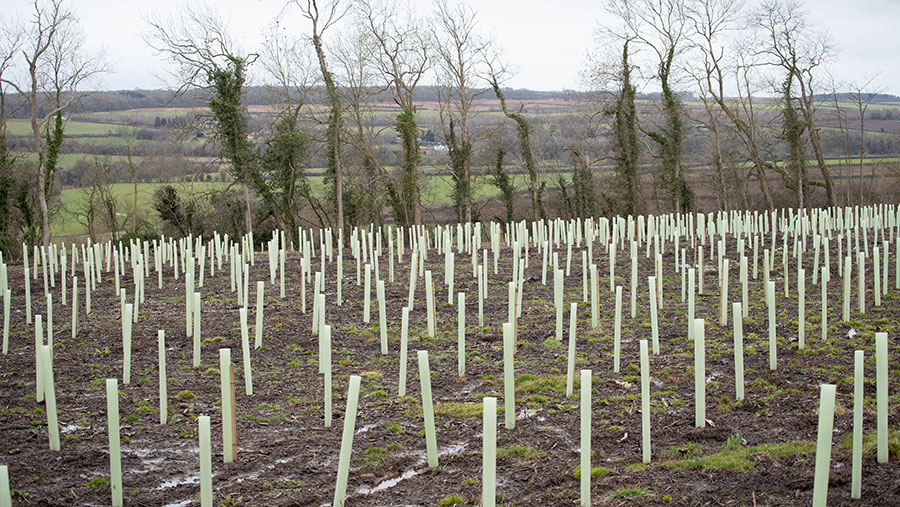Unrealistic tree planting targets will fail, says watchdog
 © Tim Scrivener
© Tim Scrivener Private landowners and farmers feel discouraged from planting trees due to uncertainty about the future direction of agricultural policy and funding streams, according to a report by a public spending watchdog.
Farmers are paid around £8,500/ha to plant trees. From 2025, government will mainly fund tree planting through the Environmental Land Management (ELM) scheme.
However, uncertainty over the design of ELM means Defra has been unable to develop detailed plans for this transition, the National Audit Office (NAO) said.
See also: How to plant the right tree in the right place on your farm
Farmers were also weighing up whether tree planting or other environmental activities available to them under ELM may be more attractive, or better suited to their business, the watchdog said.
Defra also did not carefully consider whether its targets for tree planting in England are realistic, according to the NAO assessment (PDF).
Despite working quickly to set up new tree planting schemes, the government looks set to fall short of what it set out to achieve in 2021-22.
Nature-based solutions, including woodland creation and management, form part of the government’s strategy to reach net zero carbon emissions by 2050.
Defra’s ambitious target of planting at least 7,500ha of trees each year by March 2025 requires farmers to subscribe to the schemes under its Nature for Climate Fund Tree Programme.
Defra estimated that between 1,400ha and 1,900ha of new trees would be planted in 2021-22 and to realise its target of 7,500ha per year by 2025, its ambition was to plant 2,577ha.
At no point in the past 50 years has the annual rate of tree planting in England reached 7,500ha and it has only surpassed 6,000ha in three of the past 50 years.
Head of the NAO Gareth Davies said: “Defra has done well to launch new schemes to support landowners to plant trees.
“Yet despite its efforts, it is not expecting to achieve the amount of new tree planting in 2021-22 that it set out to, and should have done more to make sure its targets were realistic.”
‘Unrealistic’ targets
Meg Hillier, Labour MP for Hackney South and Shoreditch and chairwoman of the Commons public accounts committee, labelled the programme “half baked”.
She added: “Working at pace meant some of the basics weren’t done. Defra didn’t stop to think whether its tree planting targets were realistic, and hasn’t worked out a way to properly measure its own performance.”
In response to the report, Defra secretary George Eustice said: “The challenge of climate change requires stretching targets and high ambition.
“The NAO report acknowledges that we have worked at pace in difficult circumstances to rise to this challenge but we are under no illusion that there is more to do. That is why we will treble the number of trees planted rates by the end of this parliament, backed up by over £500m.”
‘Plant the right tree in the right place’, says NFU
Farmers understand the importance of managing existing woodlands and creating new woodland which offers obvious benefits to the environment, particularly contributing to British farming’s net zero ambition, the NFU said.
But tree planting must be carefully considered with the right policies and funding incentives to ensure that it can work for all farmers, including tenants, alongside productive farming.
The NFU said its own Tree Strategy calls for government policy to ensure that “the right tree is planted in the right place”.
NFU deputy president Tom Bradshaw said: “Tree planting must be carefully considered with the right policies and funding incentives to ensure that it can work for all farmers, including tenants, alongside productive farming.
“Planting trees forms a key part of the NFU’s net zero plan and farmers recognise their role in helping to deliver it. Thousands of trees have been planted in the past year alone and many more will be planted on farms in the coming months to celebrate the Queen’s platinum jubilee.
“It is important we are smart in our approach to tree planting as we cannot end up in a situation where we are losing productive and versatile farmland and reducing sustainable domestic food production, only to increase our reliance on food imports from countries with lower environmental credentials.”
